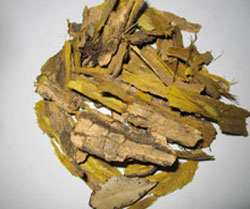- Email: sales@malharenterprises.net.in
- Phone: +91 9004684904
ROOTS
- Home / Roots
Roots
Ashwagandha / Withania somnifera
Sanskrit : Ashvagandha, Balada, Gandhpatri, Kamrupini, VajiniEnglish name : Indian Ginseng, Winter cherry, Withania root
Cultivation :Withania somnifera is cultivated in many of the drier regions of India, such as Mandsaur District of Madhya Pradesh, Punjab, Sindh, Gujarat,and Rajasthan. It is also found in Nepal.
Medicinal Uses :The root is bitter, acrid, heating, aphrodisiac, tonic, alternative, anthelmintic and useful in treatment of inflammations, psoriasis, bronchitis, asthma, consumption, ulcers, scabies, marasmus of children, insomnia, senile debility etc. According to Unani system of medicine, the root is bitter, tonic, aphrodisiac, emmenagogue, good in asthma, inflammations, leucoderma, bronchitis, lumbago, thirst etc.

Shatavari/Asparagus racemosus
Sanskrit : ShatavariEnglish name : Indian Asparagus, Hundred Roots , Asparagus roots
Cultivation :Asparagus racemosus is a species of asparagus common throughout Nepal, Sri Lanka, India and the Himalayas.
Medicinal Uses : The most important herb in Ayurvedic medicine for women Used internally for infertility, loss of libido, threatened miscarriage, menopausal problems.It both nourishes and cleanses the blood and the female reproductive organs.This herb is known to increase Sattva, or positivity and healing power.
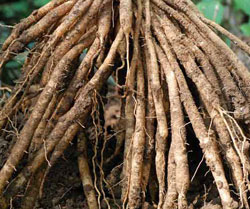
Safeed Musli/ Chlorophytum Borivilianum
Sanskrit : Swetha MusliEnglish name : Land-Calotrops
Cultivation :The herb with lanceolate leaves, from tropical wet forests in peninsular India.
Medicinal Uses : It is used in traditional systems of medicine including Ayurveda, Unani, and homeopathy.It is traditionally used for arthritis, cancer, diabetes, boosting vitality,improving sexual performance and for many other uses.
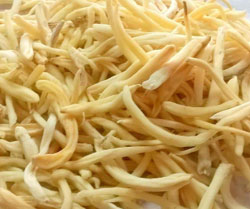
Dev Daru/Cedrus deodara
Sanskrit : Bhadradaru, Surabhuruha, Amaradaru, Devakastha, Daru, Suradaru, AmarataruEnglish name : Deodar, Himalayan Cedar
Medicinal Uses : It is used in skin disorders, asthma, pruritis, chronic inflammatory arthritis, osteoarthritis, sciatic neuralgia, relieves flatulence, pain, fever, headache, inflammation when applied locally, helminthiasis and ulcers, It is used as blood purifier, good wound cleaner and healer. Application of oil destroys bacteria from infected wounds, nasal disorders and other wounds, mumps, filarial and chancre, chronic cough and cold, in urinary disorder. Being diuretic, it alleviates many urinary disorders and benefits in dysuria and gonorrhea, puerperal disorders (health issues appearing after child birth) as it is a uterine tonic and purifies breast milk, obesity and various skin diseases.
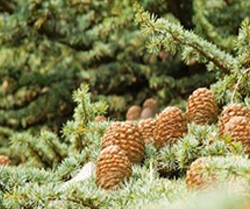
Akalkhara / Anacyclus Pyrethrum
Sanskrit : AkarkaraEnglish name : AKALKHARA- Anacyclus Pyrethrum
Medicinal Uses : Pellitory root is widely in Ayurveda used because of its pungent efficacy in relieving toothache and in promoting a free flow of saliva. The British Pharmacopoeia directs that it be used as a masticatory, and in the form of lozenges for its reflex action on the salivary glands in dryness of the mouth and throat. The tincture made from the dried root may be applied to relieve the aching of a decayed tooth, applied on cotton wool, or rubbed on the gums, and for this purpose may with advantage be mixed with camphorated chloroform. It forms an addition to many dentifrices. Being a rubefacient and local irritant, when sliced and applied to the skin, it induces heat, tingling and redness. The powdered root forms a good snuff to cure chronic catarrh of the head and nostrils and to clear the brain, by exciting a free flow of nasal mucous and tears. It is also used in premature ejaculation.
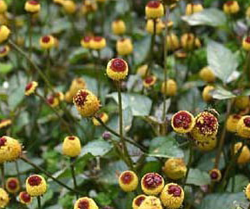
Anant Mool / Hemidesmus indicus
Sanskrit : Ananta,Gopi,GopavaliEnglish name : Indian Sarsaparilla
Medicinal Uses : The alkaloid content present in it is Tylophorine and is anti-inflammatory, antispasmodic and anti-anaphylactic in nature. The other compounds present in it are coumarin, essential oil, starch, tannic acid and triterpenoid saponins. The roots and leaves of the plant possess medicinal properties.
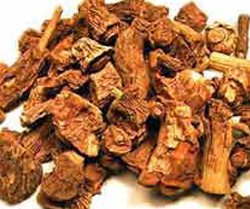
Bala Mool / Sida cordifoldia
Sanskrit : Badiyalaka,bala,baladayaEnglish name :Sida cordifoldia
Medicinal Uses : Bala is anti-inflammatory in nature and it is used to reduce the inflammation of wounds and eyes. Its external application is used to reduce arthritis pain and other joint stiffness. Its external paste is used in ophthalmic disease and wound healing. Oil prepared from this herb is very effective for the sufferers of cervical spondylitis, paralysis and facial paralysis.
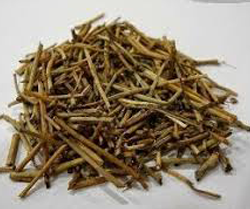
Vidari Kand / Pueraria tuberosa
Sanskrit :Swadukanda, Ikshugandha, Kandapalaash, BhumikushmaandEnglish name :Indian Kudju
Medicinal Uses :It is one of the most nourishing medicinal plants gifted by Ayurveda to mankind. Vidarikand is also known by other common name like - Indian kudju.

Chitrak / Plumbago Zeylanica
Sanskrit :ChitrakEnglish name :White Leadwort, Ceylon leadwort, plumbago
Medicinal Uses :The roots of Plumbago zeylanica or Chitrak is used in Ayurveda for treatment of various diseases related to digestive system like impaired or weak digestion, grahni, piles, abdominal pain, skin diseases etc. The plant has anti-inflammatory, anti-plasmodial (activity against parasites of the genus Plasmodium), antimicrobial, blood sugar lowering and lipid lowering properties. The whole plant in paste form is applied topically in all kind of skin diseases.
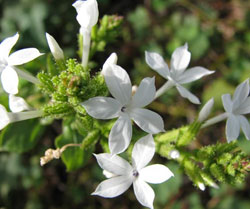
Daru Haldi / Berberis aristata
Sanskrit :Daruharidra, Darvi, Darurajani, DarhaldEnglish name :Indian Berberry
Medicinal Uses :Berberis aristata, also known as Indian barberry, “chutro” or tree turmeric, is a shrub belonging to the family Berberidaceae and the genus Berberis. The genus comprises approximately 450-500 species of deciduous evergreen shrubs and is found in the temperate and sub-tropical regions of Asia, Europe, and America.
